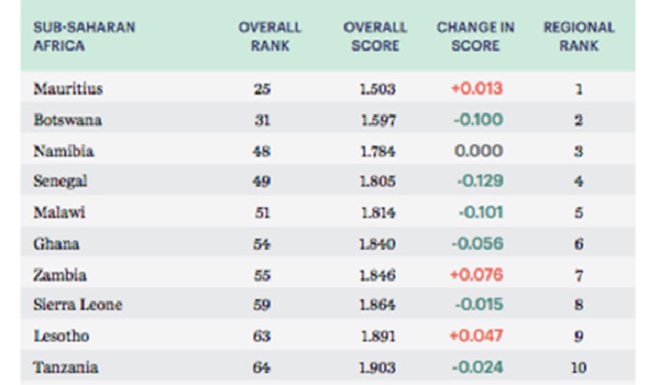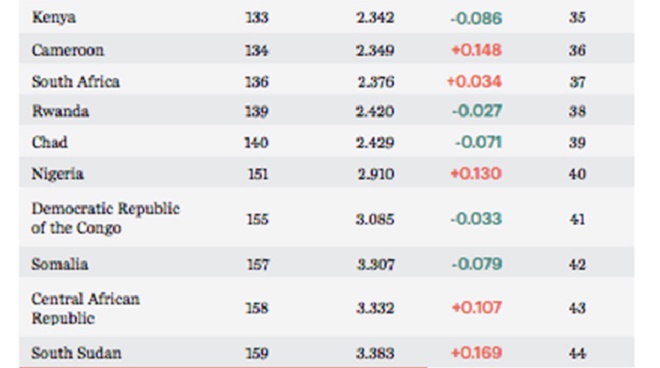Guinea-Bissau, Egypt 'most peaceful', Kenya, Nigeria, S. Africa in bottom 10 of new ranking

Wednesday, June 17, 2015
Four of the five biggest gainers on an annual list that measures peace were from sub-Saharan Africa, but the region also recorded the largest deteriorations, the ranking’s most recent edition shows.
Guinea-Bissau, which held credible elections last year was the most improved on the 2015 Global Peace Index, rising 24 places to place 120th, while Ivory Coast, Egypt and Benin were also among the five countries which most turned around their fortunes over the last year.
The ranking would appear to endorse the robust tactics of Egypt leader Abdel Fattah al-Sisi, who has overseen a sweeping crackdown on opponents but stabilised the country following the rocky aftermath of the 2011 revolution.
Sub-Saharan Africa saw a fractional improvement in peace levels, the Institute for Economics and Peace said, but North Africa recorded significant reversals, with Libya, where two rival governments are vying for power, accounting for the largest deterioration in score globally.
Niger, Djibouti tumble
Niger also tumbled 28 places on the back of regional terrorism, but the reversals in plucky Djibouti will come as a surprise to many watchers of the Horn of African country.
Its strategic position on a busy oil shipping lane has seen global powers scramble to set up military bases there, while it is also attracting foreign investment on the basis of its political stability as a one-party dominant state.
But a rising incidence in social unrest, crime and resentment of the government’s authoritarian rule informed the decline, the survey said, while also noting that being a neighbour to chronically unstable Somalia had not helped things.
The highest ranked African country was Mauritius, which placed 25th and Botswana, at 31st position. Namibia, Senegal and Malawi rounded out the top five regionally.

The top 10 most peaceful countries in Africa (Institute for Economics and Peace)
Regional economic powerhouses Kenya, South Africa and Nigeria all fared poorly, coming in at 133rd, 136th and 151st respectively, and all in the bottom ten in sub-Saharan Africa, while Ethiopia was marginally better, at 119th position.
“Peace inequality”
Globally, the world has become a less peaceful place, the report says, but explains this largely as a result of widening peace “inequality”—the more peaceful regions have become more stable, while the others have instead declined.
The report surveyed some 162 countries, of which 76 improved their score, while 86 declined. The Middle East and North Africa have steadily dipped in score on the nine-year ranking.
The economic cost of global violence is estimated at $14.3 trillion dollars. This month some 26 African countries signed a free trade area deal that accounts for $1 trillion in collective Gross Domestic Product.
The survey uses 23 indicators grouped under three broad themes—the level of safety and security in a society; international and domestic conflicts; and the degree of militarisation— to gauge the peace.
 At the bottom of the African class
At the bottom of the African class
The worst performing measure was that on refugees and IDPs, with at least 50 million people said to be affected, “the highest number since the end of the Second World War”.
Showing how internal armed conflict has dramatically increased, the survey found that some 180,000 people died last year, from 49,000 in 2010.
This has partly informed the rise in African migrants attempting dangerous journeys to Europe, a topic that was well-debated at the recent African Union summit in South Africa.
Terrorism increases
Terrorism has also increased significantly, the researchers said, “a trend that shows no signs of abating”.
Nigeria, which has been struggling with the Boko Haram menace in its north-east, was named as one of a clutch of only five countries that accounted for over three-quarters of all terrorism deaths in recent years.
Globally, Europe continued to be the most peaceful, with Iceland, Denmark and Austria leading the rankings. Syria was placed the world’s least peaceful country.
The survey also introduced the concept of a Positive Peace, which it said alludes to the “attitudes, institutions and structures that create and sustain peaceful societies”.
Countries with weak positive peace factors were for example most likely to use their military for internal suppression, accounting for African countries such as Angola which spent more on its military last year than any other sub-Saharan African nation even though it’s been at peace since a civil war ended more than a decade ago.
In those with higher levels of such peace, resistance movements were less likely to become violent “and more likely to successfully achieve concessions from the state”, the researchers said.
